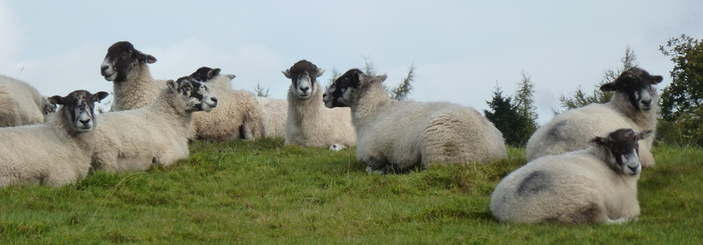Sheep
Faecal Egg Counts (FEC) RALS Ltd is very excited to announce that we are now able to carry out all your flock Faecal Egg Counts (FEC) for you using the FECPAK system (See also Our Services - Sheep page). The FECPAK system was developed in New Zealand and is only available in the UK through Innovis. Here at RALS we are now able to offer you the benefits of this system. Internal parasites cause loss of performance and growth. Faecal Egg Counting (FEC) is a simple diagnostic technique which calculates the number of internal parasite eggs per gram (EPG) of faeces. Poor sensitivity in some traditional systems will lead to increased variability and poor results. Evidence of drench resistance is widespread in sheep parasites on a worldwide basis. In the UK, decreasing our reliance on anthelmintics has never been more important. In 2003 a farm in Devon was found to have worms resistant to all three drug classes and therefore it could not fatten lambs. The only answer was to rid the farm of sheep for at least five years. Act now before it is too late. The FECPAK system allows us to undertake "on the spot" parasite assessment if necessary or we will collect samples from you which we will then analyse and discuss your flock FEC count with you and advise on your drenching options. We are able therefore to provide you with the ability to monitor worm burdens on a number of groups of stock quickly, easily and cost effectively, allowing you to make more accurate and timely drench decisions. There is a common misconception that FEC can only be used to decide whether or not to drench. The biggest advantage is in building up a picture of the unique roundworm status of your farm, (which is affected by many factors including climatic conditions, stocking rate, sheep:cattle ratio, age of stock and management practices), and using that information in conjunction with a good understanding of the parasite's lifecycle to devise strategies to limit the production losses due to worms on your property. These strategies may involve altering how often you drench, a change in your stock classes, crops and grazing management. The important issue is that you cannot make a good decision without good information, so, let us monitor it, so you can manage it. It is advised that in order to provide management information FEC must be carried out regularly at certain times of year. Between 30 - 90 composite tests per season would be fairly standard.
CAUTION! - It is important to note that some Innovis clients using FECPAK have been caught out when worming less often as animals perform poorer due to a trace element problem. Very often it was the Selenium and Cobalt in a drench that was making a difference and not the actual wormer. Mineral supplement or drench is far cheaper than worming. Financial Benefit (information provided by Innovis) Save on Drench:
Detecting a resistance problem:
" Worms can reduce growth rates by 50% with no clinical signs" If you are an organic farmer then you will need to take a holistic approach to parasite management. Contamination mapping and fine tuning your grazing management. To summarise, regular FEC monitoring will allow you to develop unique management strategies and enable you to spend less time and money on worm control without compromising on production. Let us eliminate the guesswork for you.
|


